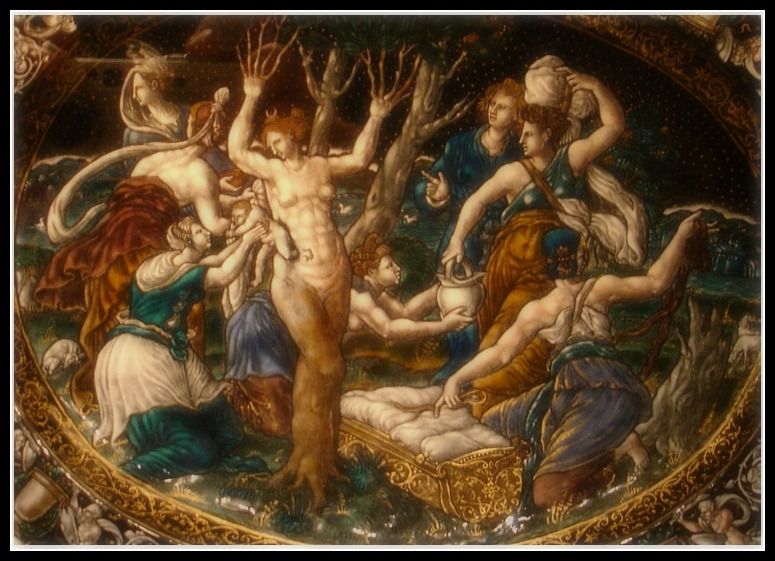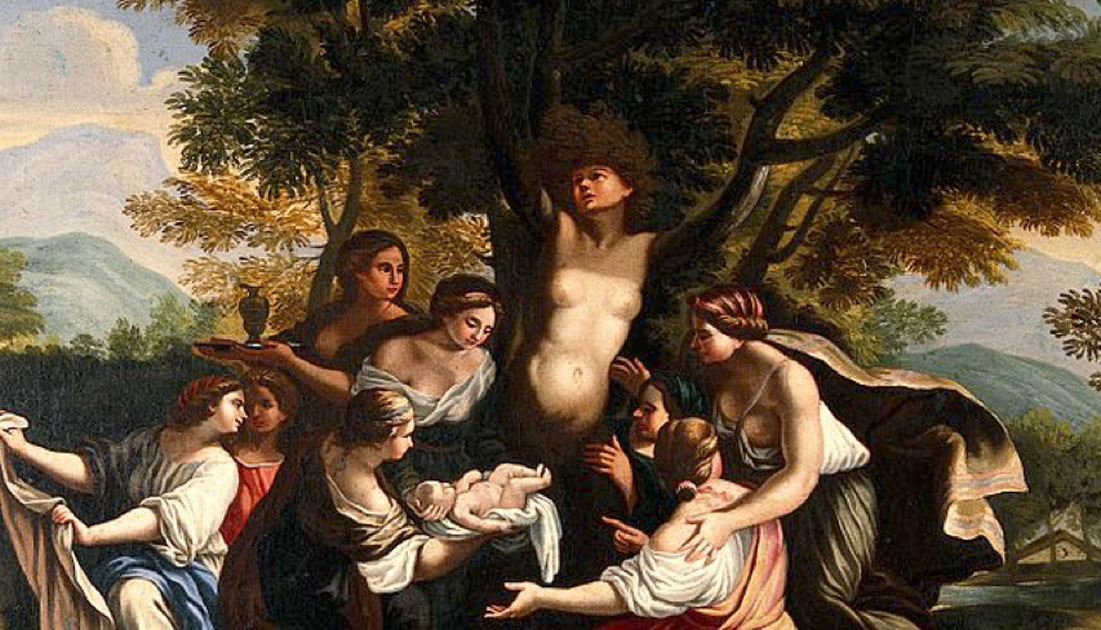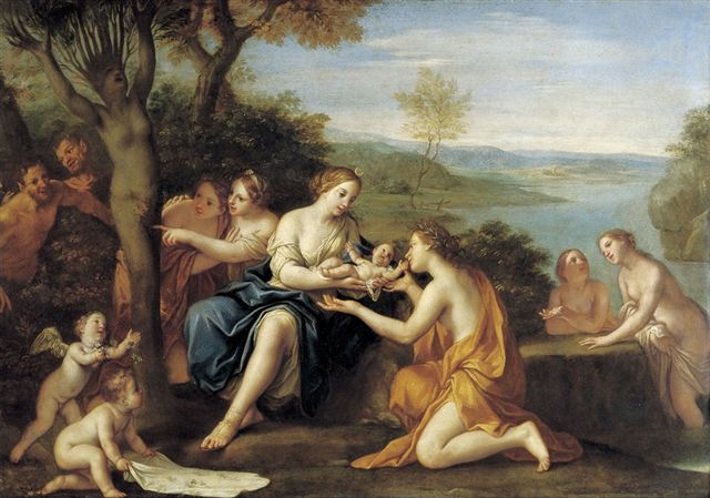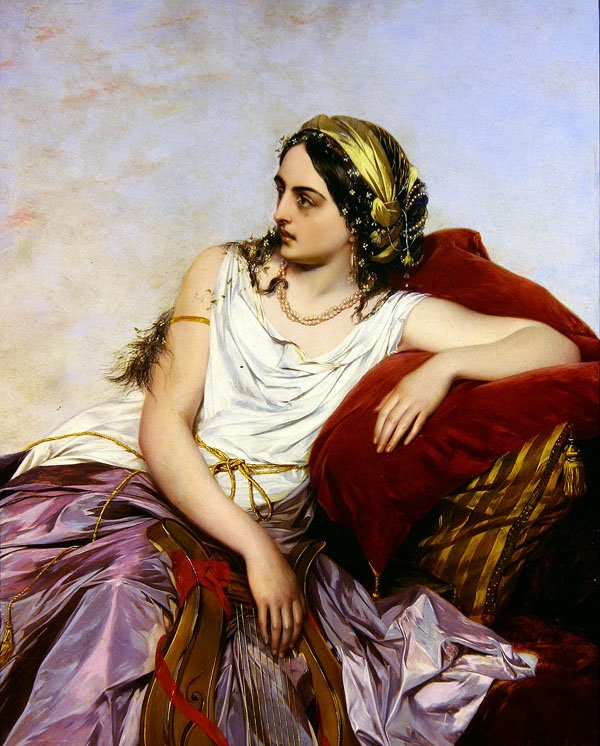Myrrha or Smyrna
Myrrha (Ancient Greek: Μύρρα), also known as Smyrna (Greek: Σμύρνα), is the mother of Adonis in Greek mythology. She was transformed into a myrrh tree after having had intercourse with her father and given birth to Adonis as a tree. Although the tale of Adonis has Semitic roots, it is uncertain from where the myth of Myrrha emerged, though it was likely from Cyprus.
The myth details the incestuous relationship between Myrrha and her father, Cinyras. Myrrha falls in love with her father and tricks him into sexual intercourse. After discovering her identity, Cinyras draws his sword and pursues Myrrha. She flees across Arabia and, after nine months, turns to the gods for help. They take pity on her and transform her into a myrrh tree. While in plant form, Myrrha gives birth to Adonis. According to legend, the aromatic exudings of the myrrh tree are Myrrha's tears.
The most familiar form of the myth was recounted in the Metamorphoses of Ovid, and the story was the subject of the most famous work (now lost) of the poet Helvius Cinna. Several alternate versions appeared in the Bibliotheca, the Fabulae of Hyginus, and the Metamorphoses of Antoninus Liberalis, with major variations depicting Myrrha's father as the Assyrian king Theias or depicting Aphrodite as having engineered the tragic liaison.
Critical interpretation of the myth has considered Myrrha's refusal of conventional sexual relations to have provoked her incest, with the ensuing transformation to tree as a silencing punishment. It has been suggested that the taboo of incest marks the difference between culture and nature and that Ovid's version of Myrrha showed this. A translation of Ovid's Myrrha, done by English poet John Dryden in 1700, has been interpreted as a metaphor for British politics of the time, linking Myrrha to Mary II and Cinyras to James II.
In post-classical times, Myrrha has had widespread influence in Western culture. She was mentioned in the Divine Comedy by Dante, was an inspiration for Mirra by Vittorio Alfieri, and was alluded to in Mathilda by Mary Shelley. In the play Sardanapalus by Byron, a character named Myrrha appeared, whom critics interpreted as a symbol of Byron's dream of romantic love. The myth of Myrrha was one of 24 tales retold in Tales from Ovid by English poet Ted Hughes.
In art, Myrrha's seduction of her father has been illustrated by German engraver Virgil Solis, her tree-metamorphosis by French engraver Bernard Picart and Italian painter Marcantonio Franceschini, while French engraver Gustave Doré chose to depict Myrrha in Hell as a part of his series of engravings for Dante's Divine Comedy. In music, she has appeared in pieces by Sousa and Ravel. She was also the inspiration for several species' scientific names and an asteroid.

Mythology
Ovid's version
Published in 8 A.D. the Metamorphoses of Ovid has become one of the most influential poems by the Latin writers. The Metamorphoses showed that Ovid was more interested in questioning how the laws interfered with people's lives than in writing epic tales like Virgil's Aeneid and Homer's Odyssey.The Metamorphoses is not narrated by Ovid, but rather by the characters inside the stories.
The myth of Myrrha and Cinyras is sung by Orpheus in the tenth book of Metamorphoses after he has told the myth of Pygmalion and before he turns to the tale of Venus and Adonis. As the myth of Myrrha is also the longest tale sung by Orpheus (205 lines) and the only story that corresponds to his announced theme of girls punished for forbidden desire, it is considered the centerpiece of the song.
Ovid opens the myth with a warning to the audience that this is a myth of great horror, especially to fathers and daughters:
The story I am going to tell is a horrible one: I beg that daughters and fathers should hold themselves aloof, while I sing, or if they find my songs enchanting, let them refuse to believe this part of my tale, and suppose that it never happened: or else, if they believe that it did happen, they must believe also in the punishment that followed.
According to Ovid, Myrrha was the daughter of King Cinyras and Queen Cenchreis of Cyprus. It is stated that Cupid was not to blame for Myrrha's incestuous love for her father, Cinyras. Ovid further comments that hating one's father is a crime, but Myrrha's love was a greater crime. Ovid therefore blamed it on the Furies.
Over several verses, Ovid depicts the psychic struggle Myrrha faces between her sexual desire for her father and the social shame she would face for acting thereon. Sleepless, and losing all hope, she attempted suicide; but was discovered by her nurse, in whom she confided. The nurse tried to make Myrrha suppress the infatuation, but later agreed to help Myrrha into her father's bed if she promised that she would not again try to kill herself.
During the Ceres' festival, the worshiping women (including Cenchreis, Myrrha's mother) were not to be touched by men for nine nights; wherefore the nurse told Cinyras of a girl deeply in love with him, giving a false name. The affair lasted several nights in complete darkness to conceal Myrrha's identity, until Cinyras wanted to know the identity of his paramour. Upon bringing in a lamp, and seeing his daughter, the king attempted to kill her on the spot, but Myrrha escaped.
Thereafter Myrrha walked in exile for nine months, past the palms of Arabia and the fields of Panchaea, until she reached Sabaea. Afraid of death and tired of life, and pregnant as well, she begged the gods for a solution, and was transformed into the myrrh tree, with the sap thereof representing her tears. Later, Lucina freed the newborn Adonis from the tree.

Other versions
The myth of Myrrha has been chronicled in several other works than Ovid's Metamorphoses. Among the scholars who recounted it are Apollodorus, Hyginus, and Antoninus Liberalis. All three versions differ.
In his Bibliotheca, written around the 1st century B.C. Apollodorus tells of three possible parentages for Adonis. In the first he states that Cinyras arrived in Cyprus with a few followers and founded Paphos, and that he married Metharme, eventually becoming king of Cyprus through her family. Cinyras had five children by Metharme: the two boys, Oxyporos and Adonis, and three daughters, Orsedice, Laogore, and Braisia. The daughters at some point became victims of Aphrodite's wrath and had intercourse with foreigners, ultimately dying in Egypt.
For the second possible parentage of Adonis, Apollodorus quotes Hesiod, who postulates that Adonis could be the child of Phoenix and Alphesiboia. He elaborates no further on this statement.
For the third option, he quotes Panyasis, who states that King Theias of Assyria had a daughter called Smyrna. Smyrna failed to honor Aphrodite, incurring the wrath of the goddess, by whom was made to fall in love with her father; and with the aid of her nurse she deceived him for twelve nights until her identity was discovered. Smyrna fled, but her father later caught up with her. Smyrna then prayed that the gods would make her invisible, prompting them to turn her into a tree, which was named the Smyrna. Ten months later the tree cracked and Adonis was born from it.
In his Fabulae, written around 1 A.D. Hyginus states that King Cinyras of Assyria had a daughter by his wife, Cenchreis. The daughter was named Smyrna and the mother boasted that her child excelled even Venus in beauty. Angered, Venus punished the mother by cursing Smyrna to fall in love with her father. After the nurse had prevented Smyrna from committing suicide, she helped her engage her father in sexual intercourse. When Smyrna became pregnant, she hid in the woods from shame. Venus pitied the girl's fate, changing her into a myrrh tree, from which was born Adonis.
In the Metamorphoses by Antoninus Liberalis, written somewhere in the 2nd or 3rd century A.D., the myth is set in Phoenicia, near Mount Lebanon. Here King Thias, son of Belus and Orithyia, had a daughter named Smyrna. Being of great beauty, she was sought by men from far and wide. She had devised many tricks in order to delay her parents and defer the day they would choose a husband for her. Smyrna had been driven mad by desire for her father and did not want anybody else. At first she hid her desires, eventually telling her nurse, Hippolyte, the secret of her true feelings.
Hippolyte told the king that a girl of exalted parentage wanted to lie with him, but in secret. The affair lasted for an extended period of time, and Smyrna became pregnant. At this point, Thias desired to know who she was so he hid a light, illuminating the room and discovering Smyrna's identity when she entered. In shock, Smyrna gave birth prematurely to her child. She then raised her hands and said a prayer, which was heard by Zeus who took pity on her and turned her into a tree. Thias killed himself, and it was on the wish of Zeus that the child was brought up and named Adonis.

Sources
Apollodorus. The Library . Translated by Sir James George Frazer. New York: G.P. Putnam’s Sons, 1921.
Chomsky, Noam. Lectures on Government and Binding: The Pisa Lectures . Berlin: Walter de Gruyter, 1993.
Grant, Michael, and John Hazel. Who's Who in Classical Mythology . New York: Routledge, 2002.
Homer. The Iliad . Translated by Alexander Pope. London: G. Routledge, 1848.
Ovid. Metamorphoses. Translated by Brookes More. Brookes. Boston: Cornhill Publishing Co., 1922.
"Wikipedia"













